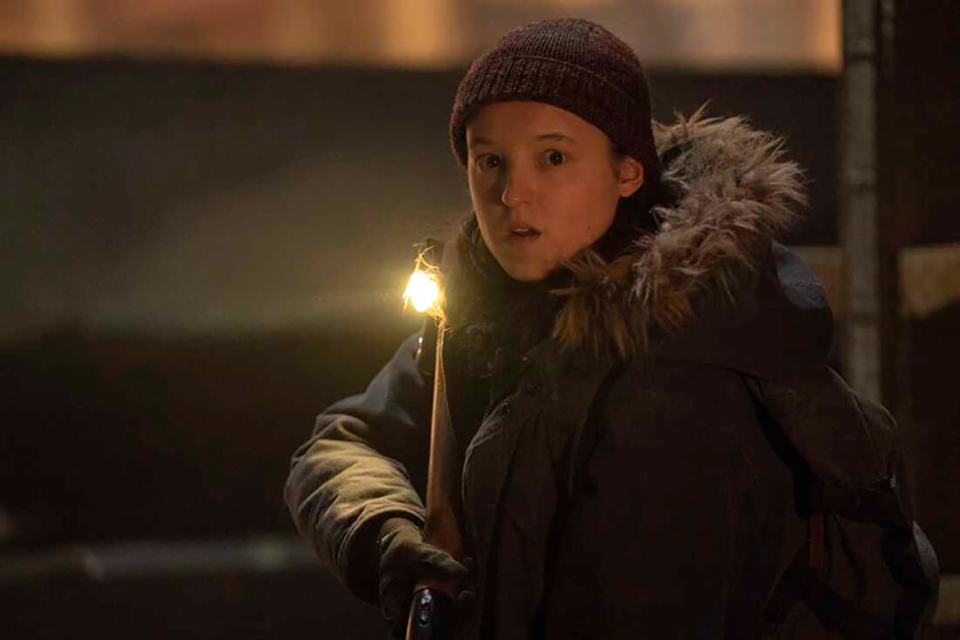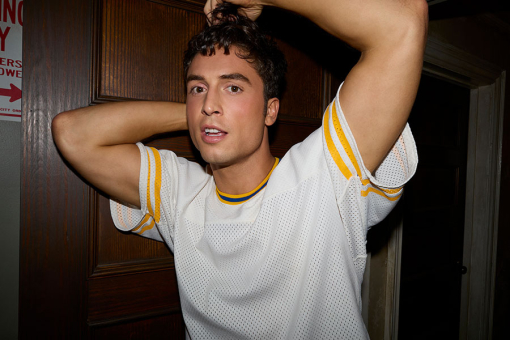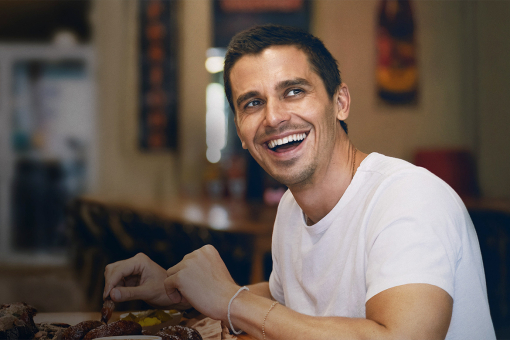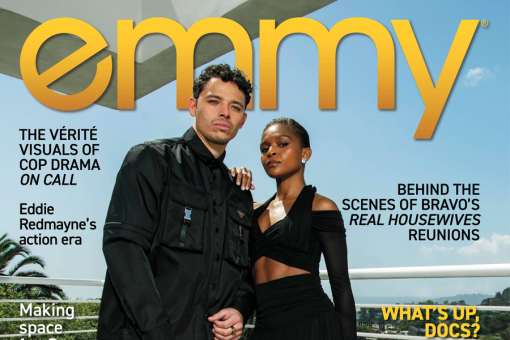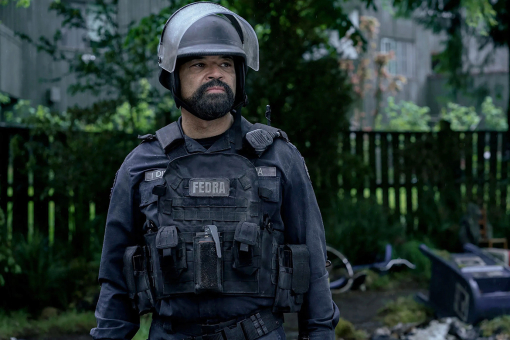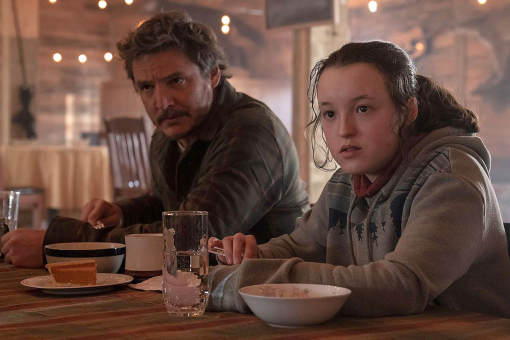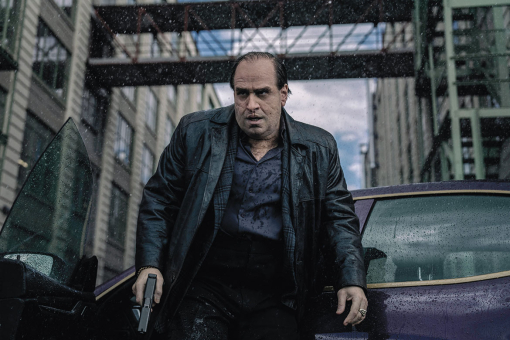"We’re always going for effective."
That is how The Last of Us showrunner, co-creator and former Television Academy Foundation intern Craig Mazin describes how he and his fellow creatives approach their storytelling on HBO’s Emmy-winning adaptation of the popular Naughty Dog video game series — especially when it comes to the heartbreaking and blood pressure–spiking events of the second season.
Working with fellow executive producers and the game’s creators, Neil Druckmann and Halley Gross, Mazin found that tentpole events from the popular second The Last of Us game — namely the brutal murder of Joel (Pedro Pascal) and the introduction of his ruthless, vengeance-fueled killer, Abby (Kaitlyn Dever) — required the writers to objectively look at the source material and find ways to adapt those pivotal moments for television.
"There are things the game can do that we just can't do as effectively," Mazin explains. "But then there are things we can do that [the game] can't do. And so, we just take advantage of what we have."
When it came to this season’s critically acclaimed sixth episode, "The Price," Mazin, Druckmann and Gross’s script took advantage of a memorable flashback in the game involving Ellie (Bella Ramsey) and Joel’s trip to an abandoned museum for Ellie’s birthday. There, the production found ways to expand upon it visually and with the soundtrack. The goal was to immerse the audience as much into Ellie’s POV as possible when the character imagines what a trip to the stars (in a pre-infected world) would feel like while seated in a real Apollo space capsule. For Mazin, it’s moments like that — and the season premiere’s introduction to recently widowed therapist Gail (Catherine O’Hara) — where he and his collaborators see their effectiveness at work. "We’re obviously trying to tell the story in a different medium, so we just follow our instincts on what would make a great TV show."
Ahead of season two’s much-anticipated finale, Mazin (via Zoom) breaks down how the production pulled off some of the season’s most memorable moments (especially in "The Price"), his early days as an intern and the writing process that he, Druckmann and Gross use when generating scripts together.
 Craig Mazin (middle) with Pedro Pascal (left) and Neil Druckmann (right) on the set of season two / Photo by: Liane Hentscher/HBO
Craig Mazin (middle) with Pedro Pascal (left) and Neil Druckmann (right) on the set of season two / Photo by: Liane Hentscher/HBO
Television Academy: How was your experience as an intern at the Television Academy Foundation?
Craig Mazin: It was amazing. All the way back in 1991. That experience is why I'm here. I had never been to California, and I certainly had never been to Los Angeles before. I had no exposure to the entertainment business. I just knew that I wanted to be a part of it. I was placed with a guy named Dan McDermott, who was the then-head of current programming at Fox Network. So I'd go onto the Fox lot every day, which was amazing. And I think it was every Tuesday, because I was an intern, I got to go to this big meeting with [former 20th Century Fox CEO] Barry Diller and [producer] Jamie Kellner, and [then–Fox exec] Peter Chernin. It was educational, so they let me attend, and all of the assistants were jealous that I got to go to this thing. I just watched as moguls made decisions and then, for the rest of the day, I was doing a lot of Xeroxing. [Laughs]
I almost knew when I stepped out of the car, I was like, “I belong.” I didn’t know what I was going to be able to do in it, but I just knew I belonged.
Well, going from Emmy intern to Emmy winner, and working on as popular a show as The Last of Us, I’d say 1991 Craig Mazin was spot on.
[Laughs] Thanks. I’d say the show is doing okay.
You, Neil and Halley co-wrote “The Price.” Some TV writers divvy up the script into acts, go off and write, then reconvene. How do the three of you approach teaming up on a script like that?
It's a bit sequential. So, for this particular episode, Neil and Halley worked on a draft. And then as I was going through production, I would talk [about the script] mostly with Halley because, then, Neil's obviously got his own other business that he runs. So, Halley and I would talk through 20 pages at a time, and we would just have a conversation. Then she would go back and revise and revise.
When in the process do you do your polish or final pass?
When I was finished writing the other stuff I had to write, then I came back around and did a pass-through on it. But it's all inside of a conversation, and that conversation is always like, “What do you think?” That's how we do it. I mean, it's effective, and it's also a nice thing to — as much as I do like writing on my own, and I do a lot of the writing just like a little monk in a room, it's nice to have other people helping and other people's thoughts to help come up with little surprises or outside-the-box ideas that I likely wouldn’t have come up with on my own without their input.
Working alongside the creators of the game — while also trying to chart your own unique adaptation of it — how challenging is it for you to tell your version of this story with respect to the one your collaborators told and that a very passionate fanbase has embraced?
Well, I think, for starters, you don't control the quality because you're trying to conform to fan expectations, because fan expectations are not monolithic. They're different. A lot of fans feel differently about things. Also, if that's what you're doing, probably somebody else could do it. With that said, my instincts are certainly fed by the fact that I'm a huge fan of the games. And Neil's instincts are fed by the fact that he created them.
So you try as best you can to push everything as close to what your intention is as possible. And then, hopefully, most people that watch the show appreciate it and like what your intention was. Where this job gets hard sometimes is — we don't always get to what our intention is. And then sometimes people see things and are like, “Well, what about this or that?” And you think, “Yeah, I agree. It didn't quite land. We weren't perfect.”
We’re always going for effective. There are things the game can do that we just can't do as effectively. But then there are things we can do that [the game] can't do. And so we just take advantage of what we have. My method is to just be as exhaustive as I can be, which is exhausting, and to try and be there every day. Try to be in every meeting and try to answer every question — especially with the way our schedule worked for season two. A lot of times I was off shooting something while somebody else was shooting something. Sometimes you have to let go of the wheel.
 Jeffrey Wright as Isaac / Photo by: HBO
Jeffrey Wright as Isaac / Photo by: HBO
When you find yourself “letting go of the wheel,” are you finding some “happy accidents” or new creative avenues to explore differently from how the game explored them? Like how “The Price” expands upon Joel’s very moving birthday present to Ellie at the museum?
Oh, yeah, certainly. That’s a great example. I mean, in the breaking of story, there’s no real accidents there. During a story break, we sometimes all just go, "I have a crazy idea."
What was one of those crazy ideas this season?
Well, I was driving around. I called Neal and was like, "Okay, I have a crazy idea about how we can meet Isaac [Jeffrey Wright] on the show."
Is that how his introductory scene in “Day One” — his interrogation and torturing of a Seraphite — came about?
Yeah, in part. That was written as a little play. And [director] Kate Herron did a beautiful job. That's one of those scenes where the intention, it all came through. And Jeffrey Wright — it helps me knowing that I'm writing for Jeffrey Wright, obviously. He’s occupying this character in a way that is so different from these other Jeffrey Wright characters that we've seen. It's just so specific. And I just knew he would get it, because, also, there's an intelligence there [to Isaac], and I wanted to lean into it.
It’s chilling that Isaac goes to such brutal lengths but fails to get the intel he wants.
And it is dehumanizing, but I also love the fact that in the end, yes, he loses because this young man would rather die than give him anything. With this scene, I wanted to communicate that this wasn't his first rodeo when it comes to torturing people. This is a speech he has given before, and he is quite calm about [delivering] it, even though there is someone he has committed violence against chained in the corner. Fear weighs heavily on his mind.
But the happy accidents are when things occur on screen that you just weren't expecting. And when those happen, you have to be plugged in enough to — first of all — recognize that they're special and also make sure that everybody around you is in a culture where they can handle that, and where they can adjust as need be. When something cool is happening, you just follow that. There are these beautiful moments on set where — I’m just thinking about [the climactic scene in "The Price"] where, thanks to Ellie, Gail realizes the story Joel just told her about how her husband died isn’t true. That moment with Pedro saying to Catherine O'Hara, "I saved her," and then a tear rolls out of his eye.
That’s obviously something that wasn’t scripted.
Yes, and part of my job is to sometimes shoot until something special happens. And that would come up all the time. Our actors — also our camera folks — would sometimes just find these amazing moments. Bella will find these cool things [to do] all the time.
Speaking of Bella, Ellie is once again joined by Joel in the show’s opening titles sequence in "The Price." How difficult, from a tech or post-production perspective, is it to re-add Joel to the titles after removing him when he died?
It’s not that bad. I mean, the pain in the butt, really, was creating that credit sequence in the first place. And Elastic, which is the company that does it, they won an Emmy for [the opening titles] — as well they should have. Nadia [Tzuo], who's the principal artist, did beautiful work on that.
So this time, those small adjustments — there's actually quite a few, like, some color adjustments and some slight environmental adjustments. But, no, that wasn't that hard to do.
And as for Joel, we get this great call back in "The Price" to him echoing his dad’s “I hope you do a little better than me” line. Was it always the intention to bookend the episode with that?
No. I mean, well, yeah — it’s both. That was something that I was talking with Neil about. I said, "Look, there's this tiny thread that I just want to plant in Ellie's mind — just a little splinter, a little bit of inception — that, no matter how bad you do, and Ellie is doing pretty poorly, that there's always a chance to turn it around." This idea that — the person that you look up to, who was ripped away from you, the person you are grieving the most, the person whose memory is driving you to do these things — they would maybe want you to not is an interesting idea. Because what is Joel saying to her? He's saying, "I murdered a whole bunch of people in a hospital. I probably robbed the world of a vaccine because of my emotional attachment to one person, because I love you in a way you can't possibly understand. But if you find yourself in my position, I hope you do a little bit better than me." And what he means by that is, "If you were in that hospital, I'd hope that you would not murder everybody."
Legacy has emerged as a key theme for these characters and those in their orbit.
I just like the idea of a positive legacy, not a negative one. “Secure our future” is a phrase that you hear a lot of unsavory groups using. Joel says, “Do a little bit better.” I think that’s beautiful.
The framing device in “The Price” of using Ellie’s various birthdays to hang the narrative on, how did you and your fellow writers land on that?
I'm particularly fond of giving the audience some sense that they're not wandering. It’s the same thing I did with the script for the mall episode in season one. It's a little thing, but Riley (Storm Reid) says, “We're here in the mall, so I'm going to show you the five wonders of the mall.” And the intention with that is, as [the audience] sees things unfold, you understand they’re building towards some sort of conclusion. It's just giving you a little bit of a comfort that this [story] isn't wandering. And once the audience realizes “Oh, we're going by birthday,” then they understand.
Those moments did afford us a chance to take these beautiful things from the game that we love — and had to [recreate] as closely as we could — and then include this other storyline that was built around [Gail’s husband] Eugene [Joe Pantoliano] and fed into how Ellie finally came to grips and confronted Joel with the truth.
 Last of Us DP Ksenia Sereda on set with Druckmann / Credit: Liane Hentscher/HBO
Last of Us DP Ksenia Sereda on set with Druckmann / Credit: Liane Hentscher/HBO
In "Day One," after Ellie gets bit by one of the Infected, a drop of rain water wakes her up and she finds herself staring down a pensive Dina and her flashlight. We never see Dina during this, just her flashlight shining into Ellie’s face and flaring the lens. Was that scripted or one of those “happy accidents” on set?
That’s a good question. [Mazin opens up the script for "Day One" on his computer and reads the stage directions for the scene in question] "A plip from high above lands on her cheek, and she stirs awake, instinctively wiping wildly at her face. And a flashlight beam whips into frame, blaring Ellie right in the face. It takes Ellie a second. The beam stays on her." So, we are never supposed to see Dina, that was all scripted. But easier said than done.
I don't want to give the impression that everyone just goes, "Oh, well, if it's there, then I'm just going to do it." Because there are times on set where it just isn't going to work as well as we would hope. And then we work with what we have, and we adjust. Sometimes it's like, "Our plan was great." And sometimes it’s like, "Our plan was good, but here's a way to make it better."
But we did pretty well this season, I would say. I'm hoping that we do even better next season.
This interview has been edited for length and clarity.

